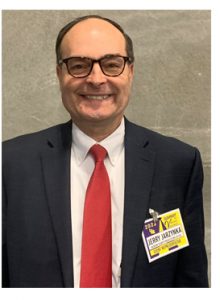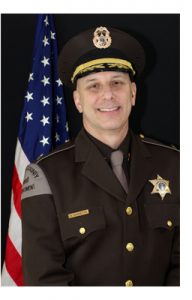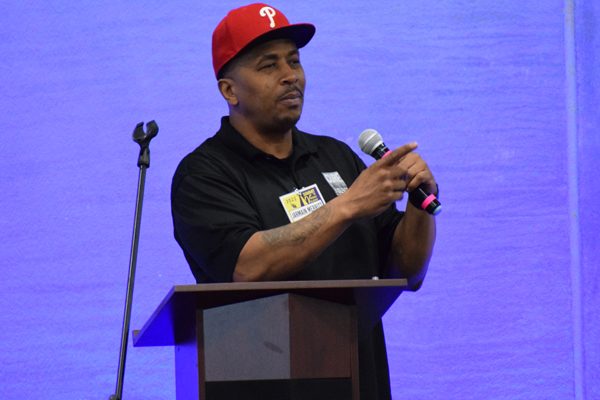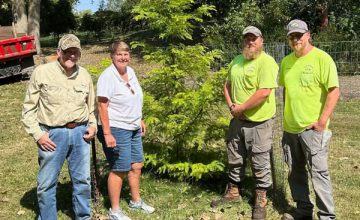Guest speaker Jarmain Merritt spoke of his growing up in a Chicago gang that led to his eventual incarceration. He beat the odds and now lives a successful life as an owner of a car dealership in Chicago in addition to his speaking on the Chicago Cure Violence initiative.
Story and photos
By John Hummer
Editor
Growing up in the streets of Chicago, Jarmain “Juice” Merritt followed the path of gang violence and lived a life that led him to spend many years incarcerated. Unlike many others in his predicament, he learned.
Upon re-entry into the free life, instead of returning to a lifestyle of violence, he chose to spend his life helping others escape the pitfalls that exist in many urban communities. He is now dedicated to helping communities reduce violence.
Merritt, now engaged with the Chicago Cure Violence initiative, was the guest speaker at the 2022 Summit to Reduce Violence, on April 8, at the American 1 Events Center at Keeley Park in Jackson. Merritt is a success story of the Cure Violence program. He came from the depths of gang life as a youngster to where he now owns his own car dealership. (more below)
Cure Violence uses an evidence-based public health approach to reduce shootings and killings by using highly-trained street violence interrupters and outreach workers, public education campaigns, and community mobilization.
“It’s individuals like me that come from the community, that comes from a background of violence, that can persuade individuals to stop doing violence,” he said. “It can’t come from someone who’s not familiar with that. That’s how we get out in front of it. We grab individuals from that community who are suitable, and we impose those individuals with the Cure Violence model, and they spread the Cure Violence model out to other brothers and sisters. They want to put the guns down – they don’t want to be doing violence. If you get the opportunity to change their mindset, they’ll take advantage of that.”
Merritt says there is usually a clique of individuals involved in the violence in a community. “Grab individuals from that clique who you can change their mindset,” is the strategy, he explained.
Merritt, who works the Cure Violence program in the city of Chicago, says the same program works in the suburbs and small towns. “What you got to do is connect with individuals in the community that are into the violence in that community. If you try to bring outside sources in to try to stop a problem on the inside, you’re going to get the wrong results,” he said. Merritt was speaking primarily of elected officials and politicians as the “outside sources.”
 Jackson County Prosecutor Jerry Jarzynka, pictured left, provided opening remarks at the summit along with Undersheriff Chris Simpson. Jarzynka said that back in 2020 the county was awarded a federal grant for a program to work on the high number of shootings and homicides per capita in the City of Jackson. The program was called Project Guardian. There are only 12 such grants awarded in the entire United States.
Jackson County Prosecutor Jerry Jarzynka, pictured left, provided opening remarks at the summit along with Undersheriff Chris Simpson. Jarzynka said that back in 2020 the county was awarded a federal grant for a program to work on the high number of shootings and homicides per capita in the City of Jackson. The program was called Project Guardian. There are only 12 such grants awarded in the entire United States.
Under the program which started in April 2021, violent crime cases are handled by a special federal prosecutor out of the U.S. Attorney’s Office in Detroit. “Tremendous efforts are being done by the city, the police chief, supporting agencies, my office, and the number of people we dedicate to cases of violence and shootings in the city,” Jarzynka said. “But then I said to the group, ‘We need the community’s help, to get involved to come up with solutions, and to get your ideas. We have too much violence and we need to reduce that. Ideally, it should be zero. But we shouldn’t have as many shootings and homicides as we do.’”
Jarzynka left with a quote from Chris Risner, an anti-opioid warrior who died of an opioid overdose a few years back: “To look the other way is to give permission.” Jarzynka continued, “We have a choice. Do we look the other way, or do we get involved? The fact that everyone is here today tells me you want to get involved and make a difference.”
 Jackson County Sheriff Gary Schuette, pictured left, gave the closing remarks at the summit along with City of Jackson Chief Elmer Hitt. “Law enforcement understands that this isn’t a situation we can arrest ourselves out of,” said Schuette of the violence problem in Jackson and surrounding areas. “That simply isn’t working. There have to be other alternative solutions. We have ideas as to what those solutions are, but we have to engage with the community in order to implement those solutions – and for the community to provide us with their ideas for solutions and see how they fit together.”
Jackson County Sheriff Gary Schuette, pictured left, gave the closing remarks at the summit along with City of Jackson Chief Elmer Hitt. “Law enforcement understands that this isn’t a situation we can arrest ourselves out of,” said Schuette of the violence problem in Jackson and surrounding areas. “That simply isn’t working. There have to be other alternative solutions. We have ideas as to what those solutions are, but we have to engage with the community in order to implement those solutions – and for the community to provide us with their ideas for solutions and see how they fit together.”
Community violence solutions groups will be meeting on a quarterly basis to evaluate those solutions, Schuette said. “The idea here is to address the problems, to understand their impact, and then bring forward solutions. It’s kind of an educated look at really how we can effect change and to stop this nonsense from continuing.” People can get involved in five different topic-based focus groups that are part of the overall effort to curb violence. Those groups are Faith-Based, Family and Victim Impact, Economic/Health Care, Law Enforcement/Judicial, and Youth Education.
“I don’t think it’s going to change overnight – I’m realistic about it – but I’ve been really excited about this,” Schuette continued. “I think it’s going to have a huge impact.”
Group quarterly meeting dates (all Thursdays)
April 21, July 14, Oct. 6, and Jan. 12, 2023
Group quarterly meeting times
1:30 to 2 p.m. – Faith-Based
2 to 2:30 p.m. – Family and Victim Impact
2:30 to 3 p.m. – Economic/Health Care
3 to 3:30 p.m. – Law Enforcement/Judicial
3:30 to 4 p.m. – Youth Education





